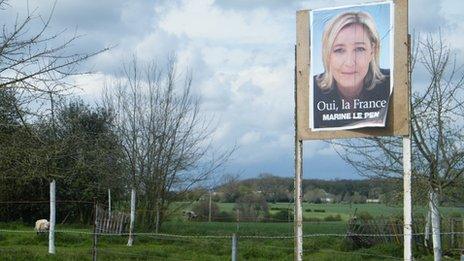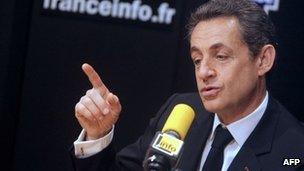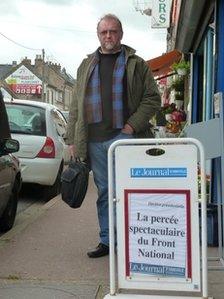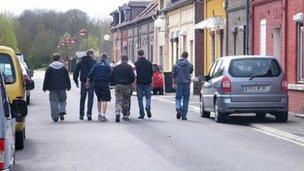France elections: Le Pen supporters look beyond Sarkozy
- Published

High unemployment in the Picardy region has led many to vote for the far right
Yvon Flahaut, a local official of the far-right National Front, shakes his head in disgust when asked if he will vote for President Nicolas Sarkozy or the Socialist Francois Hollande in the final round of the presidential election.
"There's nothing to choose between them," he says. "I'll go and vote because it's my duty, but I'll leave my ballot blank."
The National Front leader, Marine Le Pen, won almost 18% of the vote in the first round, and told thousands of supporters on Tuesday that she too would refuse to back either candidate.
Her 6.4 million supporters now hold the key to the outcome of the second-round run-off between Mr Sarkozy and Mr Hollande on Sunday.
According to the opinion polls, Mr Sarkozy needs about 80% of them to vote for him if he is to overtake his Socialist opponent's lead and win a second term.
But if the reaction of Mr Flahaut and many of his fellow party supporters is anything to go by, Mr Sarkozy faces an uphill battle.
'Sense of neglect'

Both Mr Sarkozy and his rival, Francois Hollande, have been appealing to National Front voters
The idle textile mills on the outskirts of Flixecourt, a decaying red-brick town in the Picardy region of northern France, symbolise the predicament of its people.
"We've known nothing but job losses here for 20 years and the politicians haven't lifted a finger to help us," says Mr Flahaut.
Blue-collar Flixecourt is traditionally left-wing and its mayor is communist. But high unemployment and a sense of neglect have sent many of the town's voters on a remarkable political journey to the far right.
In Flixecourt, Ms Le Pen won more votes than any other candidate in the first round of the presidential election. She did better in Picardy than in any other region.
Twenty-year-old Kevin Masse, a National Front youth organiser with close-cropped hair and an intense gaze, is typical of the party's young supporters.
Unemployed, he left school with a vocational diploma in construction trades, but without the baccalaureate needed to go to university.
"I'd like to be a machine operator or a crane driver, but it's tough to find a job," he says. "It's even hard to get unpaid work experience."
About 15% of people in Flixecourt are jobless and youth unemployment is much higher.
Like many here, Kevin feels abandoned by the apparatus of power. "Politicians come to see us before elections and the rest of the time they forget about us," he says.
He is unmoved by Mr Sarkozy's efforts to woo National Front voters, saying that "he spits on us".
'Disappearing values'
Many National Front supporters who voted for Mr Sarkozy five years ago now feel betrayed, especially on immigration.

In Flixecourt, Ms Le Pen won more votes than any other candidate
In the nearby village of Conde-Folie, surrounded by wheat and barley fields, Marine Le Pen's photo is proudly displayed in the local cafe, along with hunting and fishing trophies.
"We hate Sarkozy," says a grey-haired man standing at the bar. "We won't vote for him, whatever promises he makes."
Bar owner Jean-Francois Wogtysiak agrees. A former soldier whose grandparents came from Poland, he says the number one issue is immigration.
"We don't have enough money to take any more immigrants," he says. "Our companies are moving abroad and there's no work for French people."
Asked why immigration was such an important issue in a rural area where there are few immigrants, Mr Wogtysiak replies: "There's no work either."
"The French love their country," says Mr Flahaut. "Our values are disappearing and we see the bad effects of immigration in the big cities. We don't want that here and Sarkozy hasn't done anything to stop it."
But in other towns and villages in the area, I met some Le Pen supporters who said they would vote for Mr Sarkozy in the second round.
"I'll vote to beat the left," said Gilbert Pruvot, a retired dustbin lorry driver in the nearby village of Bernaville. "Those who cast blank votes are making a mistake."
'New right'
According to opinion polls, up to 45% of National Front supporters will swing behind Mr Sarkozy, probably not enough to secure him victory.
The polls also indicate that up to 20% may back Mr Hollande, who has conceded that immigration has to be limited at a time of economic hardship.
And he says he would maintain the ban on the Islamic face veil, a measure he opposed when it was introduced by Mr Sarkozy.
In the more prosperous town of Eu, less than an hour's drive from Flixecourt, antique dealer and National Front activist Christian Mandrosse says he won't vote for either candidate.
The party's strategy, he says, is to let Mr Sarkozy lose in the hope that his UMP party will implode.
"If Francois Hollande wins, the UMP will be in a total mess," he says. "It will be a fight everywhere and of course it will be good for us - because it will be Socialists in the future against a new right, and the new right won't be any more UMP but perhaps, National Front."
But if Ms Le Pen is seen to support Mr Hollande, she risks losing credibility.
Kevin Masse is horrified that his father, who voted for her in the first round, says he'll vote for Mr Hollande in the second. "Surely Sarkozy would do less damage," he says.
But that's not the message coming from the top.
Ms Le Pen held a May Day rally in front of a statue of Joan of Arc in Paris on Tuesday and urged her supporters to vote with their consciences, while refusing to endorse either man.
Ten years ago her father and another far-right candidate together won a similar proportion of the first-round vote in the presidential election.
Looking ahead

About 15% of people in Flixecourt are jobless, and youth unemployment is higher
But Mr Sarkozy then neutralised the National Front in 2007 by campaigning on traditional far-right issues such as immigration.
This time, however, Ms Le Pen has moderated the party's message and softened its image - and her supporters are convinced she can continue to gain more support and command new political clout.
"We're looking to the future and we're hoping to win seats in the parliamentary elections in June," says Mr Mandrosse.
Many people in Picardy blame immigration, the euro and the international financial markets for France's economic difficulties.
They believe the euro has increased prices and they resent European Union regulations which they say restrict hunting and fishing.
Ms Le Pen says she would pull France out of the euro. And she has also won support locally with promises to scrap speed cameras on the roads and abolish the system of deducting points from driving licences for speeding.